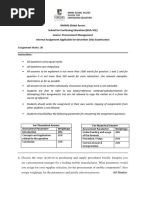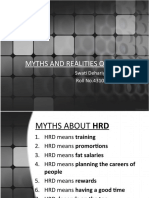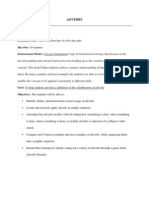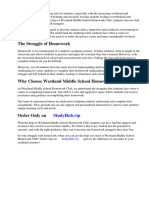100%(1)100% found this document useful (1 vote)
199 viewsPresentation On: Business Communication Interviews
Presentation On: Business Communication Interviews
Uploaded by
Nandita GoswamiThe document provides information on interviews, including:
1. The fundamental principles of interviewing such as determining objectives, learning about applicants, knowing job requirements, and developing rapport.
2. General preparation tips for interviews like researching the company, practicing interview skills, and bringing relevant materials to the interview.
3. Different types of interviews like telephone screens, in-person interviews, behavioral interviews, and panel interviews.
4. Examples of common interview questions types like experience verification, opinion, competency, and case questions.
Copyright:
© All Rights Reserved
Available Formats
Download as PPTX, PDF, TXT or read online from Scribd
Presentation On: Business Communication Interviews
Presentation On: Business Communication Interviews
Uploaded by
Nandita Goswami100%(1)100% found this document useful (1 vote)
199 views10 pagesThe document provides information on interviews, including:
1. The fundamental principles of interviewing such as determining objectives, learning about applicants, knowing job requirements, and developing rapport.
2. General preparation tips for interviews like researching the company, practicing interview skills, and bringing relevant materials to the interview.
3. Different types of interviews like telephone screens, in-person interviews, behavioral interviews, and panel interviews.
4. Examples of common interview questions types like experience verification, opinion, competency, and case questions.
Original Description:
bc ppt
Original Title
BC PPT
Copyright
© © All Rights Reserved
Available Formats
PPTX, PDF, TXT or read online from Scribd
Share this document
Did you find this document useful?
Is this content inappropriate?
The document provides information on interviews, including:
1. The fundamental principles of interviewing such as determining objectives, learning about applicants, knowing job requirements, and developing rapport.
2. General preparation tips for interviews like researching the company, practicing interview skills, and bringing relevant materials to the interview.
3. Different types of interviews like telephone screens, in-person interviews, behavioral interviews, and panel interviews.
4. Examples of common interview questions types like experience verification, opinion, competency, and case questions.
Copyright:
© All Rights Reserved
Available Formats
Download as PPTX, PDF, TXT or read online from Scribd
Download as pptx, pdf, or txt
100%(1)100% found this document useful (1 vote)
199 views10 pagesPresentation On: Business Communication Interviews
Presentation On: Business Communication Interviews
Uploaded by
Nandita GoswamiThe document provides information on interviews, including:
1. The fundamental principles of interviewing such as determining objectives, learning about applicants, knowing job requirements, and developing rapport.
2. General preparation tips for interviews like researching the company, practicing interview skills, and bringing relevant materials to the interview.
3. Different types of interviews like telephone screens, in-person interviews, behavioral interviews, and panel interviews.
4. Examples of common interview questions types like experience verification, opinion, competency, and case questions.
Copyright:
© All Rights Reserved
Available Formats
Download as PPTX, PDF, TXT or read online from Scribd
Download as pptx, pdf, or txt
You are on page 1of 10
BUSINESS COMMUNICATION
PRESENTATION ON
INTERVIEWS
ADITI JAIN (03)
AYUSHI CHAUHAN (04)
ANMOL KAPOOR (41)
NANDITA GOSWAMI (49)
AKASH BHATT (52)
AYUSH SACHDEVA (72)
MBA (M&S), SECTION-A
FUNDAMENTAL PRINCIPLES OF
INTERVIEWING
An interview is a conversation where questions are asked
and answers are given. In common parlance, the word
"interview" refers to a one-on-one conversation between
an interviewer and an interviewee.
•Determine your employment objectives
•Learn about applicants in advance
•Know the job requirements
•Create a constructive attitude
•Build an interview framework
•Develop rapport quickly
• Listen before you talk
•Respect the applicant’s needs
GENERAL PREPARATION OF AN
INTERVIEW
• Analyze the Job
• Make a Match
• Research the Company
• Practice Interviewing
• What to Bring to a Job Interview
• Practice Interview Etiquette
• Get Directions
• Listen and Ask Questions
SUCCESS OF AN INTERVIEW
• Research
• Practice
• Dress Well
• Wait Actively
• Be Punctual and Prepared
• Don't Stress
• Stay Positive
• Answer Questions Fully
TYPES OF INTERVIEWING
QUESTIONS
•Credential verification questions
•Experience verification questions
•Opinion questions
•Behavioural questions
•Competency questions
•Case questions
• Brainteaser questions
TYPES OF INTERVIEWS
•TELEPHONE SCREENING INTERVIEW- A call from an
employer to eliminate candidates based on essential
criteria.
•IN-PERSON SCREENING INTERVIEW- Provides an initial
impression of your attitude, interest, and professional
style.
•SELECTION INTERVIEW- In-depth questions to evaluate
your qualifications for the position and your ability to fit
in.
•BEHAVIORAL INTERVIEW- The interviewer will ask
questions that require you to describe how you have
handled work-related situations.
•PANEL INTERVIEW- Three or more people will
ask you questions on your qualifications and
evaluate how you fit in. It may include other
candidates for the position.
•STRESS INTERVIEW- Questions intended to make
you uncomfortable and a test how you will handle
stress on the job.
•VIDEO CONFERNCE INTERVIEW- Uses
technology for a “person-to-person” interview by
video.
•GROUP INTERVIEW- A group interview is a
screening process where you interview multiple
candidates at the same time.
EXAMPLE OF AN INDUSTRIALIST WHO
FAILED TO GIVE AN IMPRESSIVE
INTERVIEW
• Jack Ma, Founder – Alibaba, failed many times in
interviews for jobs, university etc. but still hailed
them instrumental to his success.
• Notably, he interviewed for a job at KFC, for
which he was not selected. Jack attributed the
failure largely to inappropriate dressing and not
so strong personality.
• To overcome, he started to focus more on the
lines of dress to impress, as it makes up for a
good first impression, boosts confidence etc.
WAYS OF OVERCOMING INTERVIEW
PROBLEMS
•Positive Self-Talk
•Visualize Success
•Release Muscle Tension
• Reflect on the interviews you've been through
already
•Practice asking yourself random interview
questions and answering them
•Dress to impress
You might also like
- Mba HR2Document9 pagesMba HR2monthlyreportcharhiNo ratings yet
- Lecture Notes 6 - Employee Training and DevelopmentDocument8 pagesLecture Notes 6 - Employee Training and DevelopmentAaron Aivan TingNo ratings yet
- Social Marketing Crafting A Desired PositioningDocument11 pagesSocial Marketing Crafting A Desired PositioningSadia Hoque100% (1)
- Recruitment and Selection Chapter 1 NotesDocument5 pagesRecruitment and Selection Chapter 1 Noteshallie PalmerNo ratings yet
- Forces Driving Industry ChangeDocument21 pagesForces Driving Industry ChangeRamsha SheikhNo ratings yet
- BBA Project - Chapterization PageDocument1 pageBBA Project - Chapterization Pagesarvesh.bhartiNo ratings yet
- Investigating The Impact of Corporate Rebranding On Customer Satisfaction: Empirical Evidence From The Beverage IndustryDocument14 pagesInvestigating The Impact of Corporate Rebranding On Customer Satisfaction: Empirical Evidence From The Beverage Industryalidani92No ratings yet
- Lesson Plan - Listening & Speaking - A Ride in The Safari ParkDocument4 pagesLesson Plan - Listening & Speaking - A Ride in The Safari ParkNur Fatin Syahirah100% (2)
- C B ModelsDocument8 pagesC B ModelsAditya100% (1)
- Organization BehaviourDocument3 pagesOrganization BehaviourBishwajeet JhaNo ratings yet
- Innovative Human Resource PracticesDocument19 pagesInnovative Human Resource PracticesShatrughan Singh RaghuvanshiNo ratings yet
- Strategic Management Unit 1Document25 pagesStrategic Management Unit 1Praveen Kumar100% (1)
- Mega Presentation On Bajaj Auto LTDDocument22 pagesMega Presentation On Bajaj Auto LTDraunak0% (1)
- Bba102 - Organization BehaviourDocument14 pagesBba102 - Organization BehaviourAshish JoshiNo ratings yet
- Communication and Consumer BehaviorDocument25 pagesCommunication and Consumer BehaviorimadNo ratings yet
- A Study On Employee Welfare Measures in BhelDocument19 pagesA Study On Employee Welfare Measures in BhelLovely ashwinNo ratings yet
- MPR On Hindustan Unilever Limited (M Mix)Document58 pagesMPR On Hindustan Unilever Limited (M Mix)Bhavesh GhaiNo ratings yet
- Indco: Challenges of Designing and Implementing Customized TrainingDocument7 pagesIndco: Challenges of Designing and Implementing Customized TrainingKajal YadavNo ratings yet
- Adany Television - Group 8Document7 pagesAdany Television - Group 8SnehNo ratings yet
- Retention Problems at India RetailDocument10 pagesRetention Problems at India RetailManrit WaliaNo ratings yet
- Strategic Human Resource Mgmt. CH 1 Pulak DasDocument15 pagesStrategic Human Resource Mgmt. CH 1 Pulak DasPareen Joshi100% (2)
- Quality Circle in Human Resource ReportDocument62 pagesQuality Circle in Human Resource ReportSky AxansNo ratings yet
- Chapter 6 Selection and PlacementDocument3 pagesChapter 6 Selection and PlacementJoshua100% (1)
- Procurement Management - Assignment Dec 2022 fSNq5zGGMjDocument2 pagesProcurement Management - Assignment Dec 2022 fSNq5zGGMjjefeena saliNo ratings yet
- Assessing HR Programmes:: UNIT-06 Creating HR ScorecardDocument9 pagesAssessing HR Programmes:: UNIT-06 Creating HR ScorecardAppu SpecialNo ratings yet
- Business Ethics - WikipediaDocument175 pagesBusiness Ethics - WikipediaMaricel BerdanNo ratings yet
- Motivation MBADocument31 pagesMotivation MBAAkshitaNo ratings yet
- HR GDPI Preparation Compendium 2024Document16 pagesHR GDPI Preparation Compendium 2024prasadNo ratings yet
- LNMI MBA Syllabus 2020 FinalDocument157 pagesLNMI MBA Syllabus 2020 FinalAlok RajNo ratings yet
- Target MarketDocument12 pagesTarget MarketLOOPY GAMINGNo ratings yet
- Indian EthosDocument26 pagesIndian EthosThe Light Hits TVNo ratings yet
- Mba HRMDocument22 pagesMba HRMVrkNo ratings yet
- ST MGT CH 2Document56 pagesST MGT CH 2Evad Keb BayNo ratings yet
- Mba MK1Document5 pagesMba MK1monthlyreportcharhiNo ratings yet
- Customer Retention Strategies: CRM AssignmentDocument21 pagesCustomer Retention Strategies: CRM Assignmentsunita_sandhu100% (1)
- An Industrial Visit: To Nestle India LTDDocument7 pagesAn Industrial Visit: To Nestle India LTDkavyashreembNo ratings yet
- Syllabus Global Marketing ManagementDocument3 pagesSyllabus Global Marketing ManagementBabu GeorgeNo ratings yet
- BPSM NotesDocument55 pagesBPSM NotesRadhikaWadhwa100% (1)
- Factors Affecting Talent Acquisition ManagementDocument2 pagesFactors Affecting Talent Acquisition ManagementVikas Kumar RoyNo ratings yet
- HRD Climate in Selected Public Sector BanksDocument16 pagesHRD Climate in Selected Public Sector Banksvishnu0751No ratings yet
- Octapace ModelDocument6 pagesOctapace ModelNoor Preet KaurNo ratings yet
- Hospitality ServiceDocument13 pagesHospitality Serviceajit26scribdNo ratings yet
- 3 Assignment: The Learning Process: Mental and Physical ProcessesDocument2 pages3 Assignment: The Learning Process: Mental and Physical Processesbakhtawar soniaNo ratings yet
- Read The Following Case and Answer The Questions Given at The EndDocument4 pagesRead The Following Case and Answer The Questions Given at The EndADVAITNo ratings yet
- Consumer Behavior AuditDocument19 pagesConsumer Behavior AuditMuhammad 2009No ratings yet
- Myths and Realities of HRDDocument7 pagesMyths and Realities of HRDosheenswatiNo ratings yet
- Prerequisites of Effective Incentive SchemeDocument6 pagesPrerequisites of Effective Incentive SchemeAmit Agarwal75% (4)
- Prowess BasicsDocument18 pagesProwess Basicspathakak1982No ratings yet
- Consumer Attitude Formation ChangeDocument73 pagesConsumer Attitude Formation ChangeABHISHEK CHAKRABORTY100% (6)
- Subway Case StudyDocument1 pageSubway Case StudyShobhita AgarwalNo ratings yet
- Unit - III - Labour WelfareDocument12 pagesUnit - III - Labour WelfarevelmuruganbNo ratings yet
- Hasley Premium Bonus PlanDocument4 pagesHasley Premium Bonus PlanGaurav NayalNo ratings yet
- CreativityDocument10 pagesCreativityChaco PjNo ratings yet
- Customer Success Manager Interview QuestionsDocument3 pagesCustomer Success Manager Interview Questionstylloubach100% (1)
- Competencies, Resources, Outsourcing, Value Chain, VRIODocument21 pagesCompetencies, Resources, Outsourcing, Value Chain, VRIOLAKHAN TRIVEDINo ratings yet
- Realistic Job PreviewsDocument6 pagesRealistic Job PreviewsrishiganeshNo ratings yet
- 20180811140121D2598 - P 1 - Business Ethics, Changing EnvironmentDocument26 pages20180811140121D2598 - P 1 - Business Ethics, Changing Environmentaldy sihombingNo ratings yet
- T Q C 1: C C A: EST Uestions For Hapter Omparable Ompanies NalysisDocument14 pagesT Q C 1: C C A: EST Uestions For Hapter Omparable Ompanies NalysisHe HaoNo ratings yet
- Employee Referral Programs A Complete Guide - 2021 EditionFrom EverandEmployee Referral Programs A Complete Guide - 2021 EditionNo ratings yet
- L4 Interviewing Skills 1Document49 pagesL4 Interviewing Skills 1wassim becheikhNo ratings yet
- Business InterviewDocument19 pagesBusiness Interviewpaschalpaul722No ratings yet
- CRM 1Document3 pagesCRM 1Nandita GoswamiNo ratings yet
- Questionnaire On Cavinkare's Chik ShampooDocument2 pagesQuestionnaire On Cavinkare's Chik ShampooNandita GoswamiNo ratings yet
- HRM Final ProjectDocument25 pagesHRM Final ProjectNandita GoswamiNo ratings yet
- BRM Research PaperDocument12 pagesBRM Research PaperNandita Goswami33% (3)
- Adverbs Lesson Plan-Charity SmootDocument6 pagesAdverbs Lesson Plan-Charity Smootapi-189534742No ratings yet
- Teachers Program 2023-2024Document8 pagesTeachers Program 2023-2024Jonna Ado-PalesNo ratings yet
- What Is Intercultural Competence ?Document2 pagesWhat Is Intercultural Competence ?Yesica MarmolejoNo ratings yet
- Soal Uas 2023 Kelas 3RPLDocument12 pagesSoal Uas 2023 Kelas 3RPLyasirdeanNo ratings yet
- Westland Middle School Homework ClubDocument7 pagesWestland Middle School Homework Clubafnawhhovwucnp100% (1)
- Brown Minimalist Psychologist Simple ResumeDocument1 pageBrown Minimalist Psychologist Simple Resumelleonie.leblancNo ratings yet
- Republic of The Philippines: Objectives: ContentDocument4 pagesRepublic of The Philippines: Objectives: ContentRam KuizonNo ratings yet
- Homework 2Document3 pagesHomework 2Alireza ZahraNo ratings yet
- Columbine Report Pgs 5201-5300Document100 pagesColumbine Report Pgs 5201-5300columbinefamilyrequestNo ratings yet
- HSM 36: Britain, 1815-1914 Charu GuptaDocument3 pagesHSM 36: Britain, 1815-1914 Charu GuptaShreya RakshitNo ratings yet
- Management Organizational Behavior: Individuals in Organizations: Perception, Personality, and Cultural DifferencesDocument37 pagesManagement Organizational Behavior: Individuals in Organizations: Perception, Personality, and Cultural DifferencestesfalemNo ratings yet
- Counting by 10s With Zero The HeroDocument87 pagesCounting by 10s With Zero The HerosusiebuntingNo ratings yet
- Survey For ChineseDocument4 pagesSurvey For ChinesepawxblazerNo ratings yet
- Jemrich-Lesson 3Document6 pagesJemrich-Lesson 3api-240768721No ratings yet
- Factors Influencing Child DevelopmentDocument17 pagesFactors Influencing Child DevelopmentMuhammad Zulfadhli0% (1)
- Teaching Plan Ambient AirDocument3 pagesTeaching Plan Ambient AirJoseph Nawen SindiongNo ratings yet
- The First English Panel MeetingDocument2 pagesThe First English Panel MeetingSamuel Ks TeeNo ratings yet
- Logic: Mathematics Computer ScienceDocument38 pagesLogic: Mathematics Computer Scienceb_nagarjuna5814No ratings yet
- Teaching Approaches Strategies Methods and Techniques AS9Document24 pagesTeaching Approaches Strategies Methods and Techniques AS9Mariane SibayNo ratings yet
- IES Licinio de La Fuente, Coín (Málaga) : ST A Te M Ent of P Ur P O S EDocument4 pagesIES Licinio de La Fuente, Coín (Málaga) : ST A Te M Ent of P Ur P O S Eapi-282118493No ratings yet
- Power by Magee and Galinsky (2008)Document9 pagesPower by Magee and Galinsky (2008)Bee LNo ratings yet
- ĐỀ 9Document5 pagesĐỀ 9hieum7958No ratings yet
- Research in Family Medicine in Developing Countries: Bruce L. W. SparksDocument5 pagesResearch in Family Medicine in Developing Countries: Bruce L. W. SparksKhaulla KarimaNo ratings yet
- Criss Cross PuzzleDocument2 pagesCriss Cross Puzzleapi-356179217No ratings yet
- The Scope of Clinical Linguistics PDFDocument15 pagesThe Scope of Clinical Linguistics PDFDr-Muhammad AsifNo ratings yet
- DeputySurveyor 2019 PDFDocument22 pagesDeputySurveyor 2019 PDFsaikiranNo ratings yet
- CV CS With Objective Mian Muhammad NawazDocument6 pagesCV CS With Objective Mian Muhammad NawazObstinate LadNo ratings yet
- Spring Creek Sun Nov 29 2024Document24 pagesSpring Creek Sun Nov 29 2024amoses88No ratings yet
- Pakistan Education Statistics 2016-17 PDFDocument208 pagesPakistan Education Statistics 2016-17 PDFSajid AhmadNo ratings yet





























































































